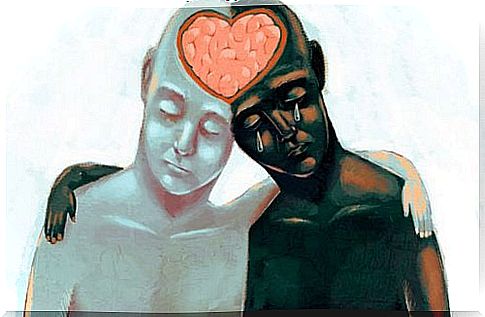Here Is The Main Cause Of Disputes

One who does not want to hear anything and does not listen to what others say. The other screaming. Two people who accuse each other, without bringing the slightest argument … The main cause of arguments is almost always the same. Especially if we deviate towards insults and conflicts empty of meaning but full of contempt and pride. We’re talking, of course, about the lack of empathy.
Think about the last time we had a fight with someone. Most of the time, when we set in motion these dynamics which start from a difference, a provocation or a criticism, we seek to impose our truth. We want the other to take our point of view. Let him realize his mistake, his wrong or unfair view of things.
In addition, another point often appears: the implementation of defensive behavior. We are entering a state where the shells are opening and above all protection and attack are sought. We often see this in our relationship, in those arguments where one of the members (or both) begins to hurl painful reproaches at the other and to do low blows … While both hide behind a position victim.
Many of these arguments would be resolved sooner if we practiced this magic word: empathy. The simple fact of trying to take into account the reality of the other and to understand it would humanize conflicts much more and make them even more useful. However, we almost always make the same mistake: we let ourselves be carried away by our emotions. These veil reason, extinguish common sense and establish insurmountable distances.

Lack of empathy and understanding, the main cause of arguments
If we all have the same desire, it is that of feeling understood. The moment someone questions things about us, criticizes us or denies our “truths”, we don’t see a threat. Anger and rage appear soon after. This is an attack on our emotional homeostasis, so it doesn’t take long for us to start an argument.
If we take a quick look at this less scientific and more popular literature that exists on the topic of conflict, we will first come across the classic article of How to Win a Dispute in 6 Steps or How to Come Out as a Winner and Triumph in 6 Steps. ‘an argument. We take our disagreements and arguments for battlegrounds. As if there always has to be a winner and a loser. It is time to correct this idea.
The most frequent origin of arguments is not that the world is full of narcissistic people. People with whom we can never reason, profiles eager for new disputes. These profiles exist but they do not represent 100% of the population. The main cause of our conflicts is our lack of understanding of the other and the absence of real, practical and useful empathy.
Many must think that these are only good intentions. Because in life, many arguments start from an unfair trigger or a real offense that we must face at all costs. But even in these situations, it’s good to put yourself in the other person’s shoes and find that there may be no point in starting an argument. It would mean a waste of time.
Empathy is the best place to start in any situation. See, feel and decipher the other so that you can then act accordingly.

How to get along?
We now know that the main cause of arguments is the misuse of empathy. How can we put it into practice to avoid these situations and reach an agreement? Here are some strategies.
- When we disagree with someone, we need to do the following: ask ourselves why we feel this way. Let’s see what is behind this embarrassment, annoyance caused by a word or comment ( is this an unfair attack or is there something true about this review, something that we do not accept? )
- Once our emotional reality has been defined, as well as the reason for this discomfort, it will be time to do the same with the other person. Let’s try to put ourselves in the other’s shoes and guess, understand, discover. Is he or she an insecure person? Is that why she attacks me? Is she embarrassed by something I’ve done in the past and does she still have that resentment deep inside her? Did she say / do this out of fear of losing me or because she wants me to react?
- The third step is that of commitment. Instead of letting ourselves be carried away by our emotions, choose to control them and lead them to a solution. Our engagement will focus on an agreement. We must not look for culprits, bring out old stories, or blurt out words that will further intensify the differences.

We must be able to calm our anger or our rage. The other must feel that we are open. He must be able to feel this empathy, visualize this attempt at understanding. Our willingness to reach an agreement must be noticed. This is not easy and takes time. Not to mention hard personal work. However, this effort can help us enjoy our relationships more.










